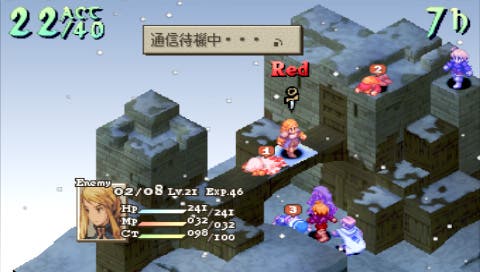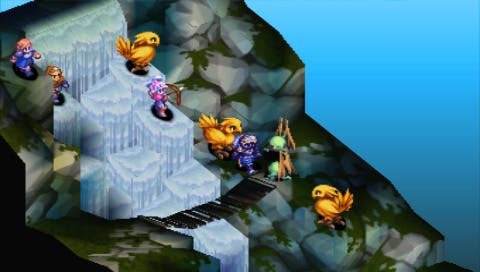Final Fantasy Tactics series
We check out the new DS and PSP Tactics titles.
In 1949 the New Statesman held a contest inviting readers to send in parodies of the great novelist and playwright Graham Greene. So distinctive and unique was his writing style that it apparently invited parody. A few weeks later the publication announced the winners and, to both their and his surprise, second place went to Graham Greene himself, who had written in secretly using a pseudonym.
For Square-Enix the muted critical and (Japanese) fan reception to Final Fantasy Tactics Advanced, sequel to the widely-lauded PSOne original, must have left them feeling much the same way as Greene. In trying to ape their earlier and greater work they seemed to have lost what made it so special.
Now, in what could be taken as a hedged bet, the company is re-releasing an updated version of the majestic original onto the PSP, while also putting the finishing touches to the GBA game's sequel on the DS in a two-pronged attack.
Final Fantasy Tactics: The War of the Lions (PSP)
The original Final Fantasy Tactics released ten years ago is one of, if not the finest Strategy RPGs ever conceived. Yet its brilliance was no fluke.

Yasumi Matsuno was a young videogame director working at a small Japanese development tribe called Quest. He and his team had created a game for the Super Nintendo (later ported to the PlayStation) known as Tactics Ogre. Highly-esteemed in Japan this fantasy-styled chess game was supremely well-balanced, building upon the basic game structure laid out by Sega's Shining Force series. Its competence and flair caught the eye of Square's founder and president Hironobu Sakaguchi.
Rather than attempting to compete with Quest, Sakaguchi simply made an offer and bought the company outright, took Matsuno under his wing as his protégée and instructed him to start work on a Tactics Ogre-style game based in the Final Fantasy universe.
Now working with Square's massively deeper pockets Matsuno was able to unfetter his dreams for the perfect SRPG and, together with luminous friends such as Hitoshi Sakimoto (the composer who went on to soundtrack Radiant Silvergun and Final Fantasy XII) and the supremely talented character artist Akihiko Yoshida, craft a game of astounding artistic coherence.
Sitting down to talk through the game's ported update on PSP, producers Shingo Kosuge and Takamesa Shiba, wholeheartedly agree. "The original game was nigh on perfect," Shiba enthuses. "It's incredible how well the game stacks up after all these years - it really is a masterpiece of game design."
While thematically and internally poles apart from the mainline Final Fantasy games, Tactics captured the imagination of the Japanese public and was a roaring success. Even today it remains one of the country's most popular videogames. This month the remake features on the front covers of no less than six game magazines in the country.
However, in the West the game didn't fare so well. Its U.S. release was shamed by an abortive translation that left Matsuno's rich and complex political drama cut into mostly incoherent ribbons. The game never secured a European release and, thanks to a small print run, found fame only as a cult hit in the States.
Reassuringly Kosuge is quick to assure Eurogamer that the localisation team are already working on a completely new translation. Likewise the game has enjoyed a few other welcome additions. Balthier from FFXII is a playable character (following in the tradition of FFVII's Cloud and Aerith's appearance late in the game), two new job classes are being added (Onion and Dark Knight) and, most impressively, a whole new head-to-head battle mode is included.

Eurogamer, having spent some time with the multiplayer - not wanting to brag but we actually beat Kosuge in a close fought fight - can confirm it works supremely well. Each player picks out five characters, chooses each one's class and equipment, before being launched into an arena to fight in the orthodox manner.
The game's demanding difficulty has only been tweaked in one place according to Shiba: "One battle in Chapter 3 with Wiegraf was notoriously difficult in the original. We've adjusted the difficulty there but otherwise the game offers the same challenge it did before."
The final addition comes painted by Yoshida himself who has created exquisite artwork for the game's numerous new cut-scenes. Although we did notice some slight slowdown this seems like a brilliant port and, as Square's localisation team is currently one of the best in the world, we're extremely excited to see the game being so reverentially handled in a way it absolutely deserves.

